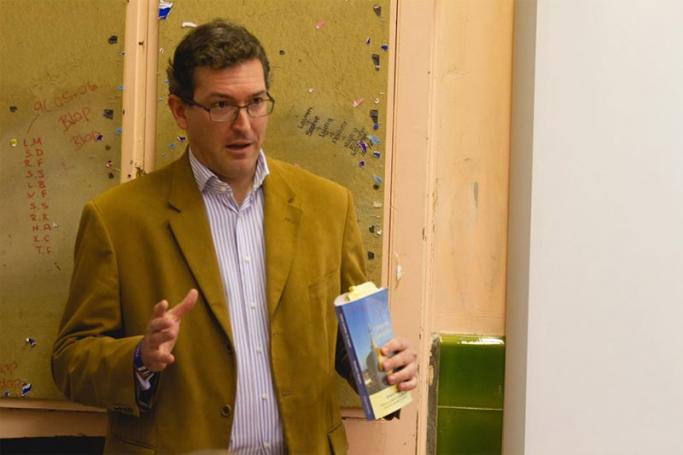A Myanmar court’s decision to jail two Reuters journalists for seven years a week ago represented a near-fatal hammer-blow to the country’s fragile press freedom, and gravely undermines the credibility of Myanmar’s democratisation.
Imprisoning journalists is a hallmark of a dictatorship, and was commonplace under Myanmar’s previous military regimes. But press freedom is fundamental to democracy, and to jail reporters for doing their job – investigating and exposing a massacre in Rakhine State – is a major setback for hopes of a democratic transition. It is yet more evidence that Myanmar’s military remains in charge, even though a democratically elected civilian government led by Aung San Suu Kyi and the National League for Democracy (NLD) is nominally in office.
Six years ago, Myanmar was full of signs of hope. President Thein Sein, a former general, embarked on a series of supposed reforms including the release of most political prisoners, a ceasefire process with Myanmar’s ethnic nationalities, and the relaxation of restrictions on civil society and the media. Increased space for the media meant that this publication and its rival, The Irrawaddy, were able to operate and publish inside the country, dozens of new publications were established, foreign news organisations posted correspondents to be based in Yangon, and the censorship board was abolished. Training courses for reporters were set up and investigative journalists grew in confidence about what they were able to report. On my visits I would meet with, and even sometimes give interviews to, Myanmar media outlets. To my surprise my book Burma: A Nation at the Crossroads was publicly available, in English, in Yangon, and my biography of the country’s former dictator – Than Shwe: Unmasking Burma’s Tyrant – had been translated into Burmese and sold on street corners. The translation happened without my knowledge or approval, but I didn’t mind – I was just happy to see that it was possible. I joked that “copyright” in Myanmar meant “the right to copy”. Even just two and a half years ago, when I brought Britain’s first-ever half-Burmese Member of Parliament Paul Scully to Myanmar, we were followed by media in a way that appeared astonishingly free and relaxed. A new era, it appeared, was beginning, with the challenge of strengthening journalistic ethics and standards, rather than facing censorship.
Today, while boldly expressing their solidarity with Wa Lone and Kyaw Soe Oo, reporters in Myanmar must be feeling nervous. Has the door to press freedom that appeared to open for a few years slammed shut again?
Wa Lone and Kyaw Soe Oo are the most high-profile and most extreme case, but they are not alone. They were charged under the Official Secrets Act, but other unjust laws, particularly the Unlawful Associations Act and the Telecommunications Act, are used to intimidate and harass other reporters. The local free speech watchdog Athan has founded that since the new government took office in March 2016, at least 34 journalists have been charged under the Telecommunications Act alone, facing up to three years in jail for ‘defaming’ others. For those not already charged or jailed, it creates a dramatic disincentive to investigate and report sensitive stories.
In a sense, although a seven-year jail sentence is horrific, Wa Lone and Kyaw Soe Oo are more fortunate than other reporters. Employed by one of the world’s largest and most influential news agency, Reuters, their case has caused outrage around the world. The United Nations Secretary-General, the British prime minister, the United States vice-president and other world leaders and international advocacy groups have condemned the sentence. Last week a group of 30 Parliamentarians, diplomats and lawyers from around the world, including former foreign ministers, former Chief Justices and former ambassadors, issued an open letter calling for their release. They describe the imprisonment of Wa Lone and Kyaw Soe Oo as “a grave miscarriage of justice which fundamentally undermines Burma’s fragile democratisation”. The reporters were, they argue, jailed simply for “doing their job of investigating and reporting atrocities committed by the military in Burma”. Freedom of the press, they continue, “is fundamental to democracy” and “the refusal to acknowledge the truth, the concerted efforts to hide the truth, and the imprisonment of two young men for reporting the truth are all indications that [Myanmar] is continuing in the ways of repression and lies favoured by past military regimes … No democracy can be built on such bloodshed and lies.”
According to the press freedom group Reporters without Borders, Myanmar is ranked 137 in the world, and has fallen from 131 the previous year. Another group, Article 19, claims that the “assault” on press freedom in Myanmar has “intensified” since the new government took office. And the Committee for the Protection of Journalists says that Myanmar's media, both local and foreign, are “under heavy assault as security measures used to suppress the press under military rule are reactivated”, marking “a dramatic reversal in recent press freedom gains”. Some local reporters, such as the Pulitzer Prize-winning journalist Esther Htusan, who worked for Associated Press, have fled the country after facing a campaign of intimidation and threats.
With the vibrancy and courage of Myanmar’s civil society and its young reporters, press freedom will never completely die. Brave journalists will continue to find ways to push the envelope and create space. But the imprisonment of reporters is a severe blow, and the apparent flourishing of media freedom just a few years ago now seems a more distant dream.
Benedict Rogers is East Asia Team Leader at the international human rights organisation CSW, and author of three books on Myanmar, including ‘Burma: A Nation at the Crossroads’.












